#campaign: key to the apocalypse
Explore tagged Tumblr posts
Text
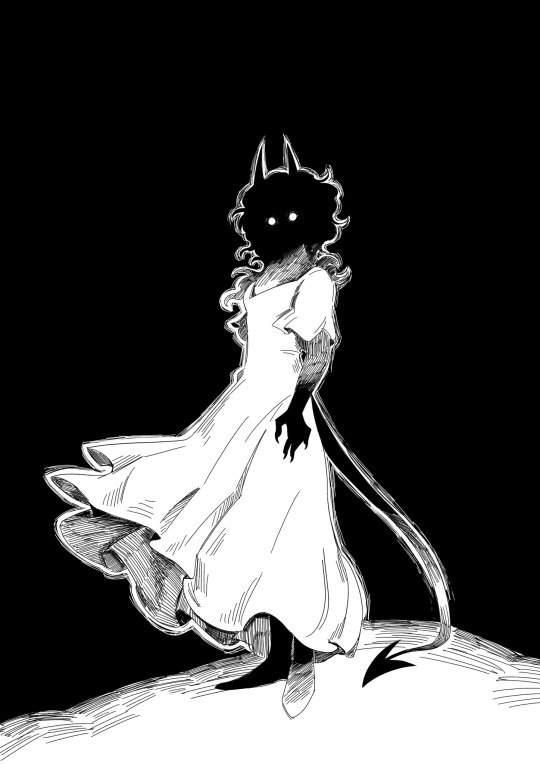
When my dnd character gets to be a little scary >>
#art#digital art#artists on tumblr#dnd#dnd art#dnd character#my art#character art#tiefling#wizard#original art#dnd stuff#Eryth#she aint called the key to the apocalypse for nothing#my ocs#my dnd characters#campaign: key to the apocalypse
611 notes
·
View notes
Text
Tabletop Session Prep Notes Highlight
"[Director Hob] is eager to talk about fairies and the sieve, his solution to extra-chronographic leaks, particularly due to infernal and celestial forces, as he considers them the fruit flies of chronographic construction projects."
#Hazel GMs#Apocalypse Keys#ttrpgs#Gonna try to get in the habit of posting about my tabletop campaigns here#Bright and Dim Campaign
4 notes
·
View notes
Text
I think that there should be more incidental big bads
Your characters go through a door and find a boss arena with a lich in the center cackling to himself. "Finally! I have collected the seven keys to the Apocalypse Throne! Soon, the prophecy will be complete and a thousand years of blood shall descend upon the world! Mwahahaha!" No-one's ever mentioned an "apocalypse throne" or its keys or a prophecy about a thousand years of blood all campaign, and you have no idea who this guy is. You stop him and the game just goes on. None of this ever comes up again.
1K notes
·
View notes
Text
Eureka: Investigative Urban Fantasy by A.N.I.M.
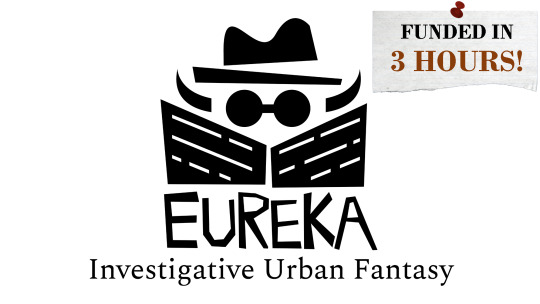
youtube
Allow us to introduce ourselves, we are The Agency of Narrative Intrigue and Mystery, or “A.N.I.M.”, a very small TTRPG studio based out of the southern U.S. but ultimately made up of people from many different walks of life.

Eureka: Investigative Urban Fantasy, our debut TTRPG, is a neo-noir investigation-focused RPG with (as you can probably guess from the title) a supernatural twist, that is currently in production after an extremely successful crowdfunding campaign on Kickstarter.
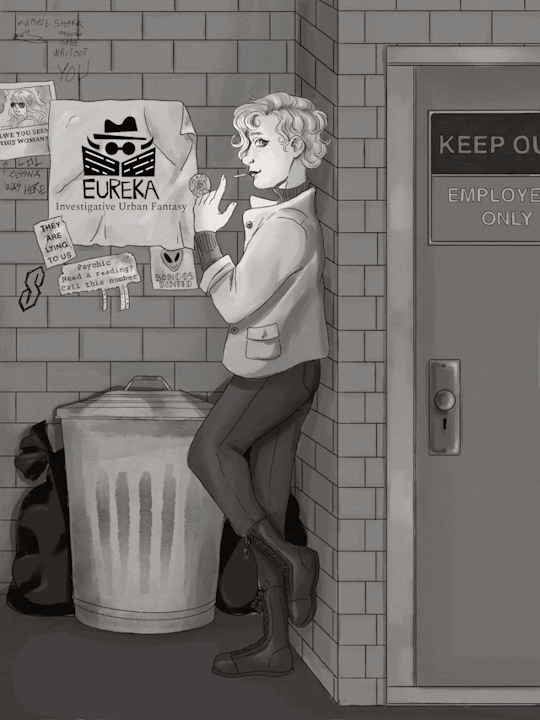
How far would you go to learn the truth?
Play amateur detectives caught up in things they barely understand, and explore how the lives of your characters unravel as they push themselves to dig deeper into the unknown!
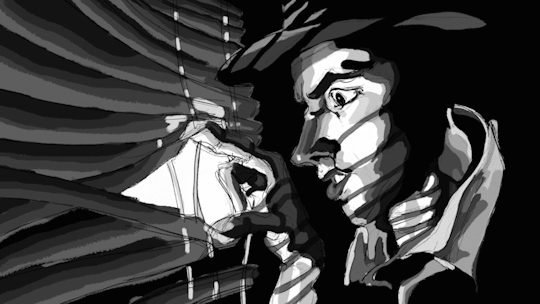
Eureka innovates on and revolutionizes investigative gameplay, TTRPG combat, and what it means to play as a monster as a character in a TTRPG, filling several voids we have noticed in the TTRPG space. Eureka supports investigation to a degree never before seen, ensuring that searching for clues is a granular and player-driven process, but also ensuring that the whole story doesn’t grind to a halt after one single failed investigation check.

Character-driven gameplay!
Stats and abilities are based on who your character is as a person. Freeform character creation allows you to build a totally unique little guy, and have a totally unique gameplay experience with him! This is supported by the backbone of the Composure mechanic. Stress, fear, fatigue, and hunger will wear your investigators down as they trudge deeper into the unknown. Food, sleep, and connections with their fellow investigators are the only way to keep them going!

Secrets inside and out!
Any investigator could be a monster, helping their friends while trying not to reveal their true natures. The party will learn to trust and rely on each other, or explode into a tangled net of drama!
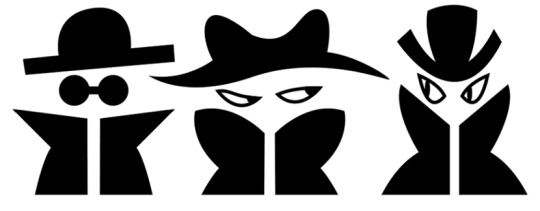
Though most PCs will be mundane humans—or perhaps because most PCs will be mundane humans—Eureka also supports playing monstrous PCs, such as a vampire, in a way never seen before. This isn’t just a watered-down stat bonus, it’s like playing an almost entirely different game, with all the monster’s strengths and weaknesses to account for while solving the mystery, plus the added incentive to keep it a secret from the other PCs as well as their players.
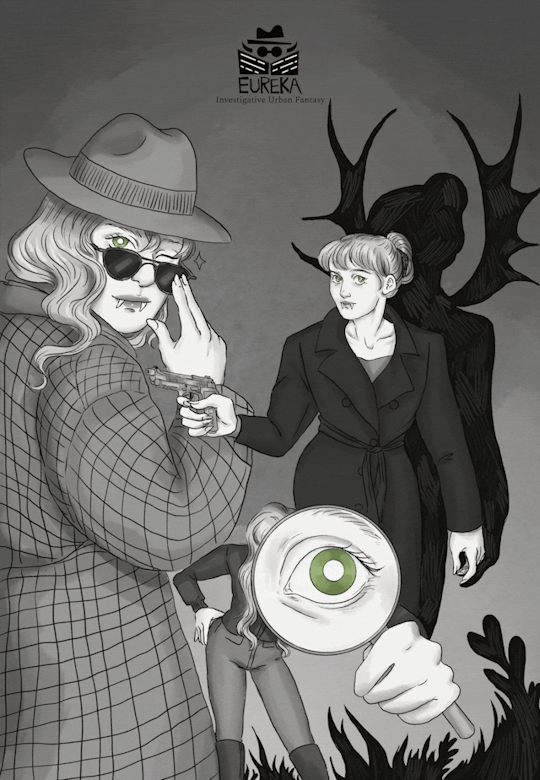
(You can also play as something like The Thing from John Carpenter's The Thing!)
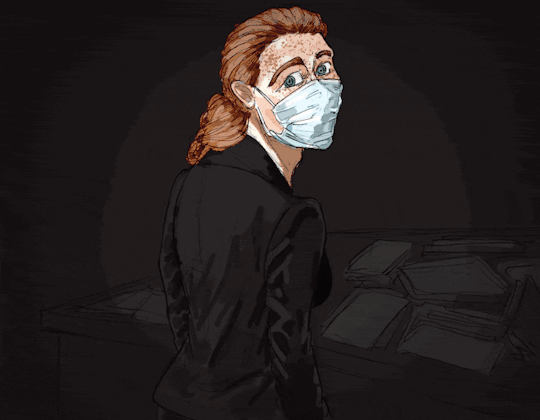
If you like or are interested in Call of Cthulhu, Monster of the Week, Dresden Files, X-Files, Kolchak: The Night Stalker, Apocalypse Keys, World of Darkness, or Gumshoe, you’ll probably find something in Eureka to really enjoy.
Intense, tactical combat!
Hits are devastating, and misses are unpredictable–firing a gun will always change the situation somehow, for better or for worse!

Now in Technicolor!
Evocative artwork from talented femme-fatales @chaospyromancy and @qsycomplainsalot and the mysterious @theblackwarden paint a gorgeously-realized portrait of a world with shadows lurking in every corner.
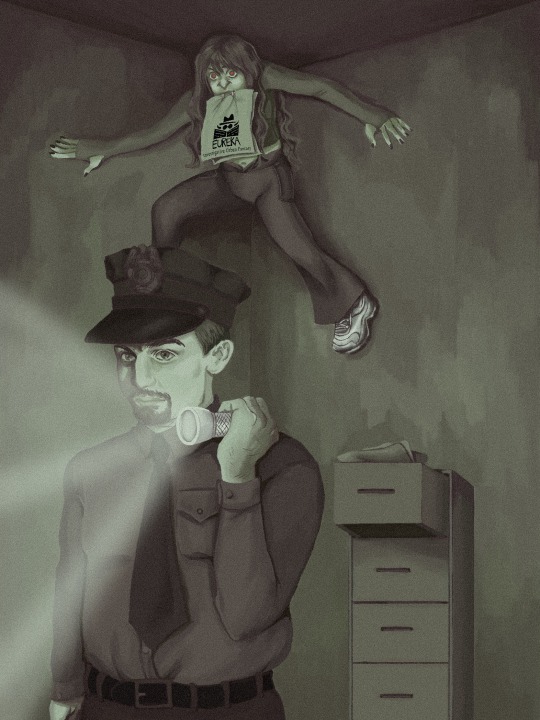
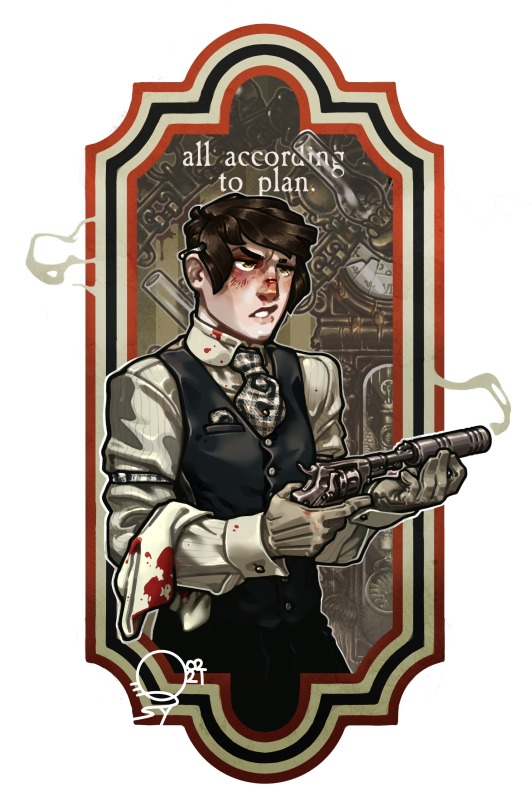
Elegantly designed and thoroughly playtested, Eureka represents the culmination of three years of near-daily work from our team, as well as a lot of our own money. If you’re just now reading this and learning about Eureka for the first time, you missed the crowdfunding window unfortunately, but you can still check out the public beta on itch.io to learn more about what Eureka: Investigative Urban Fantasy actually is, as that is where we have all the fancy art assets, the animated trailer, links to video reviews by podcasts and youtubers, etc.!
You can also follow updates on our Kickstarter page where we post regular updates on the status of our progress finishing the game and getting it ready for final release.
Beta Copies through the Patreon
If you want more, you can download regularly updated playable beta versions of Eureka: Investigative Urban Fantasy earlier, plus extra content such as adventure modules by subscribing to our Patreon at the $5 tier or higher. Subscribing to our patreon also grants you access to our patreon discord server where you can talk to us directly and offer valuable feedback on our progress and projects.
The A.N.I.M. TTRPG Book Club
If you would like to meet the A.N.I.M. team and even have a chance to play Eureka with us, you can join the A.N.I.M. TTRPG Book Club discord server. It’s also just a great place to talk and discuss TTRPGs, so there is no schedule obligation, but the main purpose of it is to nominate, vote on, then read, discuss, and play different indie TTRPGs. We put playgroups together based on scheduling compatibility, so it’s all extremely flexible. This is a free discord server, separate from our patreon exclusive one. https://discord.gg/7jdP8FBPes
Other Stuff
We also have a ko-fi and merchandise if you just wanna give us more money for any reason.

We hope to see you there, and that you will help our dreams come true and launch our careers as indie TTRPG developers with a bang by getting us to our base goal and blowing those stretch goals out of the water, and fight back against WotC's monopoly on the entire hobby. Wish us luck.

#ttrpg#roleplaying#tabletop#rpg#ttrpg tumblr#ttrpg community#indie ttrpg#ttrpg character#ttrpg art#dungeon master#monsters#vampire#vampires#urban fantasy#detective#investigation#indie rpg#indie games#indie roleplay#indie designer#indie game#ttrpg design#lovecraftian#lovecraft#eldritch#cosmic horror#lovecraftian horror#queer#eureka#eureka: investigative urban fantasy
682 notes
·
View notes
Text
In the last few days, I've now had two run-ins with people on this site regarding the idea of a TTRPG's mechanics and rules impacting the roleplay aspect of said game. And from what I can tell, these people - and people like them - have the whole concept backwards.
I think people who only ever played D&D and games like it, people who never played a Powered by the Apocalypse or Forged in the Dark system, or any other system with narratively-minded mechanics, are under one false impression:
Mechanics exist to restrict.
Seeing how these people argue, what exactly they say, how they reason why "mechanics shouldn't get in the way of roleplaying," that seems to be their core idea: Rules and mechanics are necessary evils that exist solely to "balance" the game by restricting the things both players and GMs can do. The only reasons why someone would want to use mechanics in their RPG is to keep it from devolving into
"I shot you, you're dead!" "No, I'm wearing bulletproof armor!" "I didn't shoot bullets, I shot a laser!" "Well, the armor's also laserproof!" "Nuh-uh, my lasers are so hot that they melt any armor!" "My armor's a material that can't melt!" And so on. Because we have rules, the players can't just say "we beat this challenge", and neither can the GM say "you haven't beaten this challenge." Because the rules are clear, the rules are obvious, the rules tell you what you can and can't do, and that's it.
So obviously, when the idea of mechanics directly interacting with the roleplay - generally seen as the most free and creative part of a TTRPG - seems at best counterintuitive, at worst absolutely wrong. Hearing this idea, people might be inclined to think of a player saying "I'm gonna do X", just for the evil, restrictive mechanics to come in and say "no, you can't just do X! you first have to roll a Do X check! But you also did Y earlier, so you have to roll the Did Y Penalty Die, and if that one comes up higher than your Do X die, you have to look at this table and roll for your Doing X If You Previously Did Y Penalty! But, if you roll double on that roll..."
But like... that's not how it works. Roleplay-oriented mechanics don't exist to restrict people from roleplaying, they're there to encourage people to roleplay!
Let's go with a really good example for this: The flashback mechanic from Blades in the Dark (and games based on Blades in the Dark).
In BitD, you can declare a flashback to an earlier point in time. Could be five minutes ago, could be fifty years ago, doesn't matter. You declare a flashback, you describe the scene, you take some stress (the equivalent of damage) and now you have some kind of edge in the present, justified by what happened in the flashback. For example, in the Steeplechase campaign of the Adventure Zone podcast, there was a scene where the PCs confronted a character who ended up making a scandalous confession. One of the players declared a flashback, establishing that, just before they walked in, his character had pressed the record button on a portable recording device hidden in his inner coat pocket. Boom, now they have a recording of the confession.
How many times have you done something like this in a D&D game? How many times did your DM let you do this? I think for most players, that number is pretty low. And for two reasons:
The first, admittedly, has to do with restrictions. If you could just declare that your character actually stole the key to the door you're in front of in an off-screen moment earlier, that would be pretty bonkers. Insanely powerful. But, because BitD has specific mechanics built around flashbacks, there are restrictions to it, so it's a viable option without being overpowered.
But secondly, I think the far more prevalent reason as to why players in games without bespoke flashback mechanics don't utilize flashbacks is because they simply don't even think of them as an option. And that's another thing mechanics can do: Tell players what they (or their characters) can do!
Like, it's generally accepted that the players only control what their characters do, and the GM has power over everything else. That's a base assumption, so most players would never think of establishing facts about the larger world, the NPCs, etc. But there are games that have explicit mechanics for that!
Let's take Fabula Ultima as another example: In that game, you can get "Fabula Points" through certain means. They can then spend those points to do a variety of things. What's literally the first thing on the list of things Fabula Points let you do? "Alter the Story - Alter an existing element or add a new element." I've heard people use this to decide that one of the enemies their group was just about to fight was actually their character's relative, which allowed them to resolve the situation peacefully. I again ask: In your average D&D session, how likely is it that a player would just say "that guy is my cousin"? And if they did, how likely is it that the GM accepts that? But thanks to the Fabula Point mechanic making this an explicit option, thanks to rules explicitly saying "players are allowed to do this", it opens up so many possibilities for story developments that simply would not happen if the GM was the only one allowed to do these things.
And it's only possible because the mechanics say it is. Just how your wizard casting fireball is only possible because the mechanics say it is.
#ttrpg#ttrpgs#tabletop rpg#tabletop rpgs#blades in the dark#forged in the dark#bitd#fitd#fabula ultima
677 notes
·
View notes
Text
since AAPI month is winding down here in the US I thought I'd recommend a few RPGs made by Asian designers that I've personally reviewed. Please consider throwing a few bucks to these folks, they're all working with some really fascinating stuff:
Moriah, by Kyle Tam
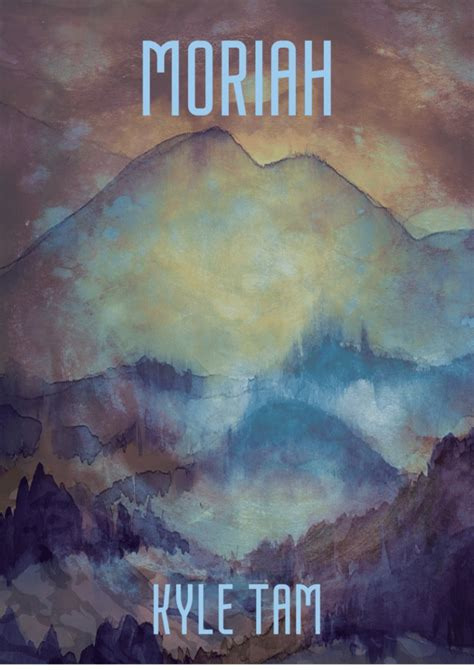
A narrative, dark linear pathway about climbing a sacred mountain the prevent the gods' wrath from annihilating the world. Genuinely one of my favorite narrative voices in RPGs to this day. Horrifically violent and grim, but I think some of you sickos who like self-mutilation, human sacrifice, and imagery out of the binding of Isaac will dig it.
Navathem's End by Sinta Posadas and Pam Punzalan
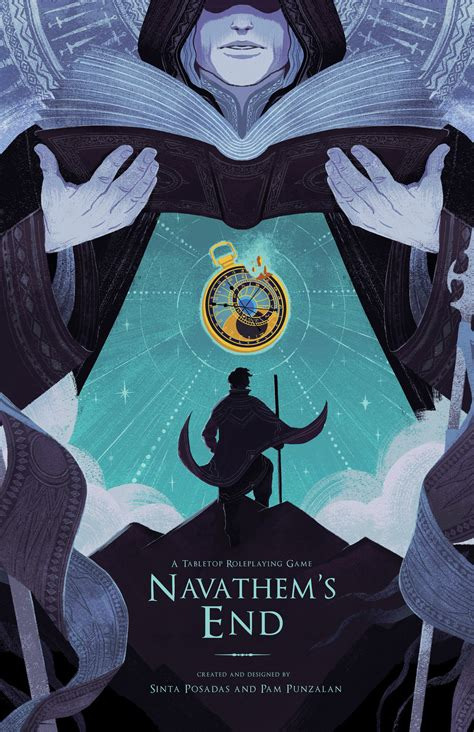
Taking elements from both PBTA and Blades in the Dark, Navathem's End is a beefy, beautifully illustrated fantasy game where players act as agents of an organization fighting against the consequences of the Gods. I really liked some of this game's unique twists on character advancement, I think this game is ripe for a long campaign if you're trying to shift your table away from D&D.
Spectres of Brocken by Aaron Lim
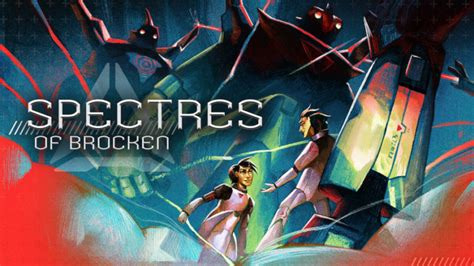
Mech fantasy meets high school AU. Spectres of Brocken lets you establish rivalries and romances while in a military training academy, and then play them out on the battlefield after a timejump. I think Lim explicitly is basing this off of Fire Emblem: Three Houses, but if you've ever imagined being stabbed by your high school crush in a spear-wielding death machine, you should read through this one!
Apocalypse Keys by Rae Nedjadi
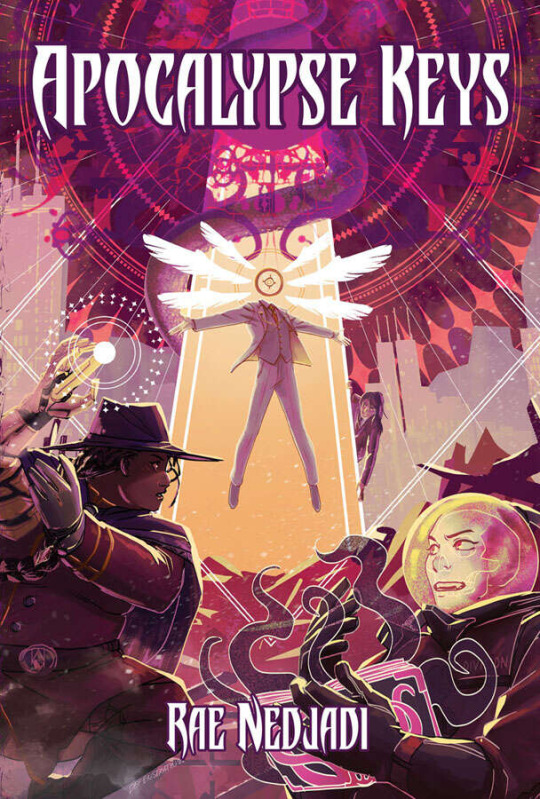
Hellboy meets Men in Black meets sad gay found family that'll eventually have to kill each other. Play as agents of the DIVISION that hunts down monsters threatening your world, while struggling to keep your own monstrous impulses in check. Perfect for monsterfuckers, as well as folks who thought Monster of the Week wasn't queer enough.
Ten Thousand Days for the Sword by Emily Zhu
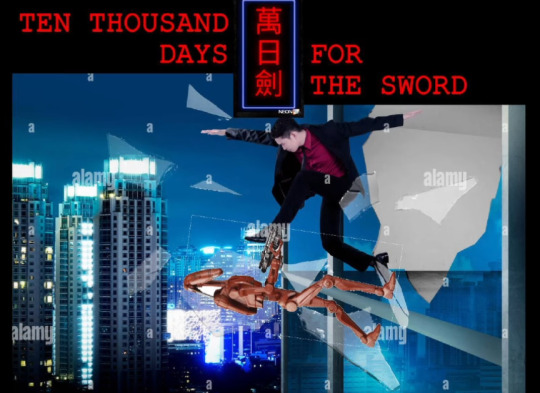
Emily Zhu is my favorite tabletop designer. Their prose is immaculate, their brain is enormous, and their design is out of this world. Play as wuxia warriors battling in a cyberpunky city, using hundreds of martial arts techniques (such as Horse and Turn into a Demon) to best rival factions. Genuinely such a cool and fascinating game, I played a small campaign of it and it was SO MUCH FUN, thanks in no small part to Zhu's phenomenal writing.
241 notes
·
View notes
Text
Flipping through Apocalypse Keys for the first time, what immediately strikes me is that a lot of playbooks have moves where rolling too high can result in accidentally spawning additional monsters, who will implicitly or explicitly go on to become significant antagonists. While this is perfectly consistent with the game's genre, suddenly I'm picturing a group where – whether by collusion or coincidence – every single player character is built with one of those moves as their thematic cornerstone. The poor GM has a whole arc planned, but it never gets off the ground because the party keeps generating new monsters of the week in an endless chain reaction of fumbled rolls. "There Was an Old Lady Who Swallowed a Fly"-ass campaign.
834 notes
·
View notes
Text
Why C3E51 worked so well (a DM’s perspective)
I have seen a lot of absolutely bananas critiques of C3E51 (thankfully not nearly as many around here, far more on Reddit, which I should not have visited). And the ongoing theme of those critiques is that Matt should not have imperiled former PCs, and if he brought them in should have either done lengthy side-bars with those characters or let them win the fight against Ludinis and have a chance to take him out themselves, since they’re ‘god tier’ or ‘high level’ and that makes ‘logical sense’. What these critiques really boil down to, IMO, are people who were really invested in the former campaigns upset that their faves didn’t get to do cool things, treating it more like a TV show than a game. But even as a TV show, that would have been disappointing from a narrative perspective. Because even in a TV show, this is a sequel spin-off show, starring new characters. The story is about THEM. And more importantly, the game is about the players and about telling their story.
So let’s break this down from a DM perspective. How do you build a Kobiashi Maru situation for your characters? For those of you who aren’t familiar, the Kobiashi Maru is a Star Trek term for a scenario designed from the jump to be unwinnable (Kirk beat it by creativity, but later admitted that he missed the point of it). In Star Trek this was done to test what a future officer would do if faced with certain failure. In a D&D game it’s a little more complicated. Part of it is to set up the BBEG, put their plan in motion, and set the stage for the next leg of the game. But it’s also to give your players, who are clearly into it, a darkest-hour scenario. Not every player group is going to be into facing down the Kobiashi Maru, and it’s clear from the aforementioned critiques that a lot of them are on Reddit. Power-gamers who always want to win are not going to enjoy this sort of storytelling, but players who are really into RP and working through difficult times and failures will eat this stuff up. And this is absolutely the sort of table playing on Critical Role. There is a level of trust there that can only be built after years of working together, and this was finally the moment when Matt could pay off years of planning and campaign-spanning set-up.
Matt carefully plotted the structure of this episode out to give maximum agency and impact to a party of dramatically under-leveled characters. And they knew going in they were under-leveled. This wasn’t a surprise, but a potential suicide run by people who knew they weren’t the heroes they needed to be, but were the only heroes in the right place at the right time to try anything. So they came up with as good a plan as they could, and executed it fairly well, all things considered.
They knew they couldn’t take on Ludinus directly (and this was a great way to demonstrate exactly how much he had planned and how long, to bring in elements from C2, hints we’ve had for years about Ludinis, only to reveal it went deeper than any of the characters could have imagined), so Matt gave them some winnable objectives. This is a great way to keep the characters invested in an unwinnable scenario: the ultimate outcome may be beyond the characters, barring some insane genius or incredible rolls, but they can still help. They can do something that will have a tangible impact on events and hinder the baddies enough to give them another chance at a rematch and a way to stop the apocalypse when they’re higher level. So Matt gave them the batteries: take out as many as you can. While this would not stop the ritual, I suspect that the more they took out the more Ludinis would have to drain his own power to make the key work, and the longer the process would take. Knocking out the feywild key, as well as multiple power sources turned what would have been an instantaneous event if they had done nothing into a more drawn-out affair which, I suspect, could be stopped or even reversed. It gave them a window to come back and demand a rematch.
Then we have the high-level PC allies, and how to play with those sorts of characters without pulling focus from the PCs. Matt handled this very well, by having the players roll for their former PCs, taking the specifics of their actions out of his hands and letting the dice of the former players decide. He also revealed that Keyleth’s involvement, and baiting Vax with Otohan’s permadeath poison, was key to Ludinis’ ritual, which was why she couldn’t just dive in and clean everything up. But again, because of this story, it ties less back to Keyleth and more back to Orym. That was the point of the attack on Zephrah, to get her attention by getting her to look into who did it and then coming to get some payback, but the little guy on the ground has always been caught in the middle. Orym has been Ludinis’ unwitting pawn from the off, his family’s deaths merely a means to an end, and that is vicious and amazing set-up for character growth for him.
Beau and Caleb had to be there by the logic of the story. It didn’t make sense that Caleb would sit out a world-ending event orchestrated by a Cerberus Assembly member after spending years trying to take them down. Beau would obviously go with him. It also made sense that they would be the only two there, because they were scouting when Ryn got taken down, and after that were trying to keep a low profile. Shit accelerated too fast for them to call in reinforcements.
Which is the in-story reason for them to be there, but isolated and vulnerable, making them useful allies and wildcards (who likely could have been more useful if ultimately failing as well, but failed early thanks to Liam and Marisha’s rolls). But they were still outmatched. I have no idea what the challenge rating of Otohan, Leliana, and Ludinis are, but we know Otohan was considered ‘beatable’ back in Bassuras. That indicates she’s the lowest CR, particularly with the glowing weak-spot on her back. But she can still wreck a level-20 PC if she gets the jump on her, which she did. And that meant that she remained a massive threat. Caleb and Beau were playing it smart, keeping to the shadows, but still got caught by Leliana. Between dice rolls, careful planning, and some great enemy design, Matt really set up a team that could take on high-level players and win. And he made it clear that Ludinis did not leave this to chance. He has the best people he could muster after 1000 years of planning. Nothing short of a miracle could have truly stopped them.
Which is why we cut back to Bells Hells. Because ultimately this particular story isn’t about Keyleth or Vax or Caleb or Beau or any other former PCs. This is about the current party being caught up in events much larger than them and having to rise to the occasion. This is the story of the schmucks sent in to take out the batteries, but who have personal beef with the big bads. Ludinis orchestrated the plan to attack Zephrah to bait Keyleth and draw out Vax, and Otohan carried it out. And he used Orym as a pawn throughout all of it. This makes taking them down, but especially taking Otohan down, the cornerstone of Orym’s personal quest. Letting an NPC take her down would be taking away a critical part of his motivation and goals, which is an absolute no-no for a DM. NEVER bring in a god-tier NPC and take away player agency or story beats. Especially never have them resolve important player goals and backstory events! Every NPC, even the powerful ones, are there to support the story the players are telling. So of course Keyleth wasn’t going to take out Otohan. Of course she wasn’t going to stop the ritual. Beau and Caleb might have been able to do something more if Liam and Marisha hadn’t rolled so badly for them, but ultimately, they had to get caught or fail in another way.
For the sake of gameplay, Bell’s Hells had to be the only functional team. They had to be the ants that were beneath Ludinis’ notice long enough to really accomplish something. And as much as it feels like they failed, they had minor victories: Laudna and Ashton took out more batteries, making Ludinis drain his own power to kick off the apocalypse. They only failed to take out Otohan’s backpack by 2 HP, which showed them that she was an achievable goal in the future. If they had rolled a little better, they probably could have taken her out entirely, which would have felt like a big accomplishment for them. Imogen made her mother pause in her assault before doubling down. This leaves open very interesting future beats for their interactions. Can she ultimately redeem her mother or would she have to take her out? Every step that Matt set up in this episode, from the reveals about Ludinis’ plans and Orym’s past, to Imogen’s interactions with her mother, to Chetney and likely Ashton finding themselves staring down their own backstories after the party split, was focused on this party, on getting them ready to step out of low-level play and advance.
And that’s the point of E51. It’s not a climax of the story, but the ultimate set-up. It’s putting all the pieces onto the board in a way that all the characters can now recognize. Yes, unless the players came up with something genius, the apocalypse was going to kick off, but their actions slowed everything down to a place where it could be combatted. Yes, the god-tier former PCs were always going to get neutered, because this is Bells Hells’ story, and you cannot have NPCs fix PC problems. They might have been able to do a little more before this happened, but the dice rolled.
And it’s honestly good for the PCs how things turned out. They have a clear objective, but are split up. This gives them great incentive to level up, explore character backstory, deal with their personal shit, get stronger, and then come back to kick the asses of all three of these villains (or possibly redeem one, we’ll see). Their powerful allies are now temporarily side-lined. Keyleth is badly hurt and will need time to recover. Caleb is collared and will need time to get that removed. Beau is likely up and moving now, but will need to safeguard Caleb for a while.
The Bells Hells are on their own. The Darkest Hour has come, and it’s time for them to rise up and go from nobodies to heroes. This is their true call to adventure. And as a DM, it was so cool seeing how Matt set up all the pieces over the campaign, only to pay them out in such a satisfying and motivating way in this episode.
#Critical Role#Critical Role spoilers#I really liked this episode#both as storytelling#and in terms of structure#this is how you do long-term setup#and payoff for a villain#he had planned for everything#but this annoying party of gnats muching up his works#and the gnats are going to be what takes him down#that is such a good way to let a low-level party get set up to take on a high-level villain!!#anyway#this is to combat some of the negativity I've seen toward this episode
651 notes
·
View notes
Note
Hey! Been following you a long time- I enjoy your RPG commentary!
Last night I wrapped up a two year campaign, the second of the length, that I've been playing with some friends using the *Blades in the Dark* system.
We're interested in learning a new game and I'm wondering what you suggest!
We prefer rules light games with a focus on improv and role play. What would you recommend?
If Blades in the Dark was up your speed I think you might get a kick out of Apocalypse World or Monsterhearts, provided you're okay with going for something that doesn't rely on characters cooperating with each other (both of these games all but assume that players characters will be at each others' throats). Blades in the Dark is kind of an indirect descendant of Apocalypse World on account of having started out as a hack of hack of hack of Apocalypse World, and Apocalypse World is low-key one of my favorite games of all time! Monsterhearts is good if your group enjoys teen monster melodrama and messy romance stuff. Absolutely fantastic game.
Another one I could see myself recommending, albeit one I haven't had a chance to play yet, is Heart: The City Beneath. It is like a dark fantasy dungeon crawler set in a surreal weird fantasy underworld. It's a companion game to Spire: The City Must Fall, and the two share a setting, and while I have heard nothing but praise for either game Heart seems to be the one people really go nut-nut over.
Happy to hear about you finishing your campaign! Getting to draw something like that to a close is always fantastic! :)
19 notes
·
View notes
Text


I’d do anything for her
#art#digital art#character art#dnd#dnd art#dnd character#tiefling#wizard#dnd tiefling#chronurgy wizard#artists on tumblr#dnd stuff#original art#my art#Eryth#told myself I’d finish this today and now its almost 3 am#needed a new piece for my commission sheet and who better to draw than Eryth#its become tradition for her to be my commission sheet example at this point#wouldnt have it any other way#my ocs#my dnd characters#campaign: key to the apocalypse
179 notes
·
View notes
Text

@martianworder asked me about this on my Forged in the Dark post, so here we go!
Clocks
So Clocks have been a tool that have been used before and outside of Blades in the Dark, but BitD was where I think they were made really popular.



Golem Clocks designed by cmartins on Itch.io
For all intents and purposes, a Clock is just a track that you fill, but in some cases it's preferred over a track because it fills less space, and it's easy to just draw a clock on a piece of paper to help you keep track of something as you play.
A Clock can be more than just a track. It can be a countdown, a timer, or a representation of a person or faction's goals. The larger the Clock, the bigger task it is. Here are some examples of how you could use them.

A Healing project clock from Blades in the Dark.
A player could have a project Clock that they fill over the course of many sessions. Perhaps they want to research a cure for a vampire virus that is threatening a loved one. The GM would ask them to make a research roll every downtime, and how successful they are indicates how many slices they fill - effectively, how much progress they make towards finding a cure.
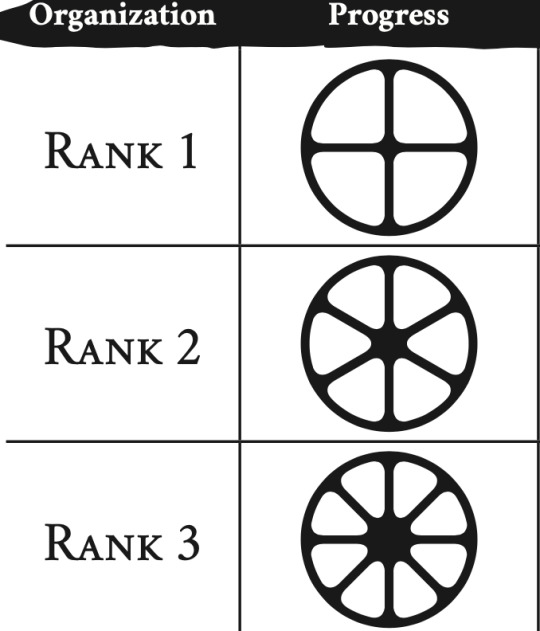
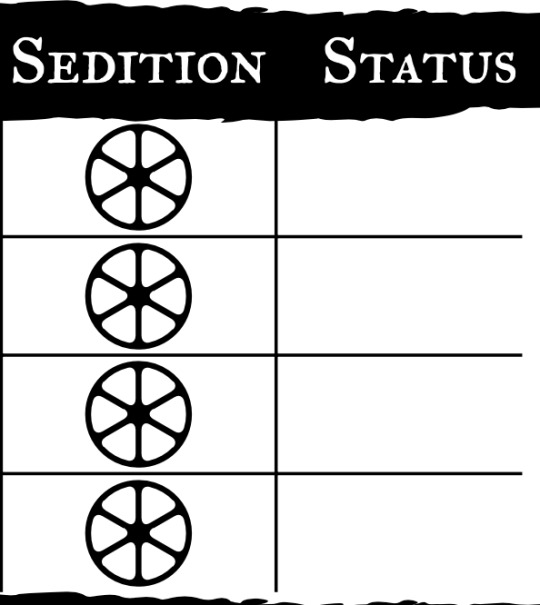
Rebellion and Sedition Clocks for Brinkwood: Blood of Tyrants.
A play group might use a Clock to track a common goal, such as winning over a number of anarchists to help take down a mega-corporation. If this is a campaign-long goal, you might use a series of linked clocks to represent the jailbreak you need to assist before you can win over a computer hacker, and then the massive hacking project you need to support before you can overwhelm the corpo servers.



Faction Clocks from Scum & Villainy.
A GM might use a Clock to track the work a Faction makes towards their goal. Every downtime section, they GM might roll to see how successful the Faction is, or simply tick one slice of the clock if the Faction has no reason not to be able to do what they want. If the Faction is allowed to work unimpeded by the PC's, they might eventually do something that changes the world around them, for better or worse.
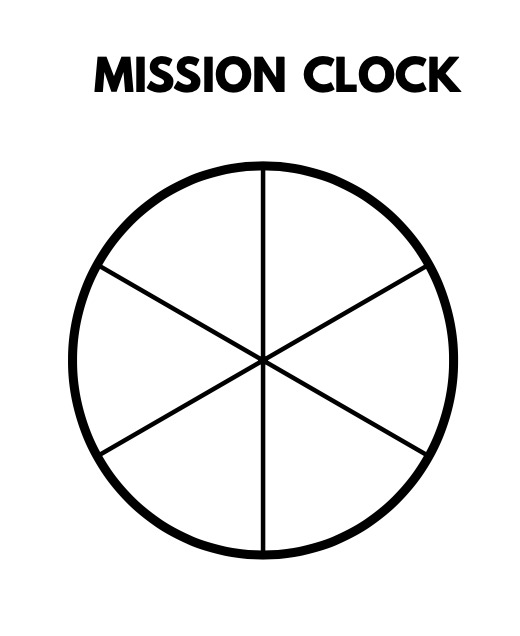
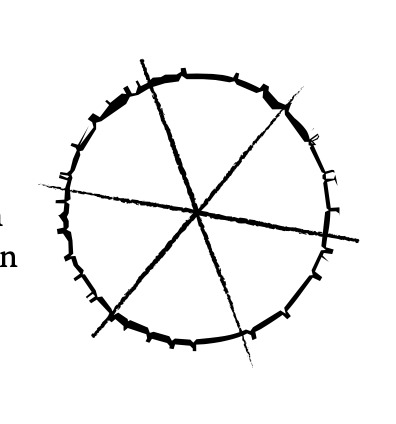
Mission Clock from External Containment Bureau and Doomsday Clock from Apocalypse Keys.
Clocks might also be used as a timer, to indicate when something terrible might happen, or when the group's time is up. This might be the amount of time before a murderer next strikes, before the haunted house claims another victim, or before the world begins to end. In some games, specific points in the clock (such as halfway, or a quarter of the way through) may trigger special events that give the PC's more information, or remind the group that the pressure is really on.

Clocks for Protect the Child.
All in all, Clocks are a great visual tool to help you and your game group keep track of what's going on in the fiction, and it can also help you keep track of a number of narrative threads in a fairly condensed space. Even if they're not built into the game you're currently running or playing, I think they're a fairly easy addition, and can certainly help with bookkeeping!
545 notes
·
View notes
Text
SPOILERS FOR UMBRELLA ACADEMY SEASON 4!!!
Everyone in season 4 was various levels of out of character.
Luther wasn't as bad. He has his previous aspect of trying to bring his family together. He cares for them and wants them to be together. But he didn't have it throughout the season. Also, considering his attitude towards Reginald in season 3, there is no way he would be that fine with being in the group to go see him. Overall, it would have made more sense if he was with Viktor in the let's go find and help Ben campaign instead of being a background character in relationship drama.
Diego would not have been an absent father. From his relationship with Stan to his anxiety of becoming his father, he would have been extremely involved. Most of the awkwardness with Stan was because Stan showed up at the age of 12 out of nowhere. Considering how he clearly had time to prepare for his children, he would have been more ready. Also, why did those twins never get named? It doesn't make sense for him to have his attitude about it with how old his kids are, and after losing Stan after just starting to get close and look after him. Also considering how forward Diego is, he should have confided in more of his siblings about his relationship issues that Five and Luther in the beginning. Which would have also induced more bonding. Overall he needed more scenes with his kids in general.
Allison would have clung harder to Claire. A big part of her character is her daughter. She spent the whole show trying to get back to her. She full ass re writes a timeline and makes a deal with her abusive father to get back to her. There is no way she would not be extremely overprotective. They also tried to paint the picture of her and Klaus always having that relationship when they did not. Sure, they were closer in season 2, but they were not always shown to have that specific Allison looking after Klaus thing. She should have also had more emotion shown about her actions back in season 3. Whether it be regret or apathy, something should have been shown. Yes, she has that minor talk with Viktor, but nothing else? Really?
Speaking of Klaus, where was his eccentric personality? Even when previously sober (majority of season 2), he still held onto his personality. If they were going to go the route they did with his characterization, they should have had a moment where he reminisced on the people he lost or something. He needed more to put him from point A to point B. Additionally, his separate side plot was ultimately useless. A thing about Klaus is that whatever odd side plot he has always ends up ultimately tying into the plot in a big way. He accidentally is productive. He finds the kugelblitz, he is the first sibling to meet Ray, he is half of the possession plotline which eventually leads to stopping the apocalypse, he's accidentally the reason the journal gets into Harold's hands, but how was his side stuff tied into the plot this season? Also, his relationship with Ben was completely un mentioned. With how Klaus is trying so hard to bond with him in season 3 while mourning his brother, there is no way he just has like no scenes with him in season 4. He wasn't there to remember Ben's death and there wasn't even a conversation about it.
Dear fuck, Five. Why did they give him a romantic interest in the first place? Not only does his character not need one or even close to needing one, his age makes any sort of romantic relationship just flat out weird. Between him being 18 or 19 physically, he's also mentally in his sixties. After the weird mid-season time skip, sure, he's physically in his mid-20s, but he's mentally 70. A relationship with anyone is weird. Let alone with Lila. It's also odd because Lila is arguably one of his only friends. They were a good duo because they were efficient and entertaining. Most of their screen time being shared is because of the commission, and they built a complicated friendship off of it. Key word friendship. Five has given so much time and time again for his family. He loves them and cares for them, even if he doesn't outright show it. He hides it beneath snark, but it's always been visible. He would not have a relationship with his brothers wife, especially knowing she did have a family back home. If anything, they would have become extremely co-dependent on each other, but not romantic. Also, Five would not be dumb enough to go travel back to go try and mess with the original Jennifer incident. He should have put up more of a protest against it, or have him agree to try when things are more desperate.
Ben after being re-introduced in season 3 is shown to be bad at being an antagonist, a part of a quote unquote family more dysfunctional than the Umbrellas and that deep down, he does want a family. In season 4, he claims to not be part of the Umbrellas family over and over again, yet is still getting together with them. He claims his family is dead, despite the fact that he did not view them that way in season 3. Also despite the fact that they tried to explain it away with the Cleanse messing with his mind, it was extremely weird how obsessed he got with Jennifer. They should have had them already met and having a pre established something in season 4, other than just straight up meeting that week. He should have also mentioned any of the Sparrows at least once if he was so insistent that they were his family. He had the perfect opportunity to at least mention one or two of his siblings at various points, but he didn't. Or maybe have him mention trying to look for them at some point in the time skip before he went to jail, something. With his desperation for family, there is no way there wouldn't be something.
It was odd how Viktor was so set on little to no contact, and then wanted to see Ben's death to be part of the team. He states to Allison how they are not friends. He is trying to establish a lack of relationship due to everything that went down without having any sort of actions or anything to fully indicate it. He should have gone fully one way or the other with whatever feelings about his family or have shown to have the more complex feelings about it. Also, if they were going to have him trying to be the one to save Ben, they should have brought up his conversation with him or something from the end of season 2. Something in general.
Lila had complicated feelings about being pregnant back in season 3 and her worries about being a bad mother. They should have had her in more scenes with her kids. Also it felt odd for her to be a stay at home mother. With all the childcare help she could get from her family, they should have given her at least a little side job. It was even weirder how she was stated to hate bracelets after the importance of the bracelet between her and Diego. She also would have known how dangerous it would be to mess with the timeline and would not have suggested it as an option unless things were more desperate. She WAS with the commission, after all. Diego and Lila should have had more conversation about the break in their relationship, especially considering what follows. She stated that her relationship with Five was for survival, but then later it was extremely hinted that she loved him, which was weird. Did the writers also forget about he did in fact kill her parents? There was no mention of it whatsoever, nothing on her feelings about it.
Honorable mention: Ray. He would not have walked out on Allison. If anything to not have him be in this season, divorce, or maybe just have him die again, idk. He would not have walked out and it's extremely insulting to him to have that be what happened
#dear god that was more writing than I intended#the umbrella academy#tua#tua season 4 spoilers#tua season 4#luther hargreeves#diego hargreeves#allison hargreeves#klaus hargreeves#five hargreeves#ben hargreeves#viktor hargreeves#lila pitts#hargreeves siblings#my thoughts on characterization
29 notes
·
View notes
Text
I’m an Environmentalist. That’s Why I Can’t Vote Green.
Award-winning filmmaker and director of Gasland Josh Fox on why he will never vote for Jill Stein.
November 1, 2024
The Nation
Milanville, Pennsylvania—Progressives can truly win in this election, even though we have a moderate Democrat on the ticket. And it’s not by voting for Jill Stein. But first, a little history…
Not long ago the entire upper Delaware River basin in Pennsylvania—one of the most beautiful areas in the country, in the watershed for New York City, southern New Jersey and Philadelphia—was on the chopping block for fracking.
A 75 mile stretch of the Delaware River could have become a toxic oil field. Fracking is an environmental apocalypse: millions of gallons of toxic fracking fluids, radioactive waste, underground water contamination, hundreds of thousands of truck trips, air pollution, land scarring, massive public health crises, and depleted water supply. Everything about the practice is toxic; it is inherently contaminating in the long and short term.
Our community was quick to understand the threat and organize and mobilize against it. Every little town along the Delaware across New York and Pennsylvania had a mom-and-pop anti-fracking group spring up. My film Gasland, on HBO, was part of this campaign, and our Gasland tours went from town to town, Johnny Appleseed–style, fostering our new movement.
Amazingly, we won. We banned fracking in the Delaware River basin and in New York State, saving the water supply for 16 million people. One of the greatest achievements of the environmental movement in this century.
We did this by convincing the Democratic governors of New York and Delaware and the president at the time—Barack Obama—to ban fracking here. These were all moderate Democrats. Not exactly Bernie Sanders, if you know what I mean.
I consider myself far to the left of Andrew Cuomo and Barack Obama. But I know that if those moderate Democrats hadn’t been in office, there’s no way we would have won.
Republicans would have just said no. This whole place would have been completely fracked to hell. We would have lost. And the whole gorgeous, life-giving national treasure of the Delaware River would have been a toxic fracking zone.
Our victory against fracking kept more carbon and methane in the ground than almost any other single environmental win in history—making it a huge win for the climate as well.
Here is the key point: I’m not in love with Kamala Harris’s positions on fracking. I find it utterly infuriating when moderate Democrats think that they need to pay lip service to a toxic destructive climate monster of an industry to win Pennsylvania. I don’t actually think that is true, because studies have shown that 70 percent of Pennsylvania residents want fracking either banned or much more tightly regulated.
But I don’t need to be in love. I need to be able to vote strategically.
Hundreds of thousands of people showed up to protect this place and to hold moderate Democrats accountable, and that was the key to victory here.
You know who didn’t show up for this place? Jill Stein. She doesn’t show up for these frontline battles. Ever.
Stein says she’s against fracking, but Stein has hundreds of thousands of dollars invested in the oil and gas industry. Did you know that? Did you know that she actually profits off of the oil and gas industry, that she has had investments in the Keystone XL pipeline and multiple fracking companies?
Did you know that she has investments in Raytheon, that she’s had investments in ExxonMobil? Did you know that she has investments in Home Depot—one of the most rapacious companies in the world, guilty of horrific deforestation throughout the world?
How is it that the Green Party candidate hasn’t divested her own personal fortune from fossil fuels? It’s sheer hypocrisy. And so is the strategy of running for president every four years but never showing up for battles like this.
In 2016, Stein defended these investments by saying they are mutual funds and indexed retirement funds.
But that, plainly speaking, is bunk.
Her claims are a slap in the face to the entire fossil fuel divestment movement. It is easier now than ever to have investments that are fossil free; doing so is a huge plank of the environmental cause. Hundreds of real activists were arrested this summer in New York City calling for Citibank to divest as part of the Summer of Heat campaign. For Stein to ignore all this and still attempt to call herself an activist is beyond hypocrisy, it is political malpractice. Shame on you, Dr. Stein! Shame on you for profiting from fracking and oil drilling.
I’m not in love with Kamala Harris’s positions—on fracking, and on some other issues. But I will tell you what I am in love with. I’m in love with our movements.
I’m in love with what we can do. The entire history of progressive progress in this country is of movements pushing moderate presidents. It happened with FDR and the labor movement. It happened with LBJ and the MLK and the civil rights movement. It happened with Obama and Biden and the movement for gay marriage. We organize and push them—and that’s how we get what we want. That’s our progressive history in America.
But in order for us progressives to do our jobs and fight effectively for a more just and equitable world as a movement, we need to have Harris in office. If we have Donald Trump in office, there’s no chance in hell that we’re actually going to advance an environmental agenda.
So I urge you to please believe in us as a movement. Love us. Believe in our power. We have done this before—and we can do it again with a moderate Democrat in office. Which is the only choice we’ve got right now.
If everyone in who voted for Stein in Pennsylvania, Wisconsin, and Michigan had voted for the Democrat instead, Trump would never have been the president.
We have the true power. It comes from the bottom up.
And I believe in us.
A vote for Harris is a vote for us, a vote for our movements to have a fighting chance for change. Progressive politics and advancing our agenda in this country is not something that happens every four years when you vote, or every four years when a toxic egomaniac like Stein (or Trump, for that matter) runs for president. It is a daily commitment. So vote for Kamala Harris. Join the movement—and I’ll see you on the front lines.
#jill stein#green party#election 2024#us politics#us elections#kamala harris#harris for president#vote democrat
17 notes
·
View notes
Note
Mechanical question since you're familiar with a ton of systems, do you know any trrpgs that have explicit mechanics for allowing the GM and or players to set the length of the campaign itself?
Ive been doing tabletop for a while now and one of the skills I'm trying to work on right now is to end my campaigns on a more satisfying note and part of that for me is figuring out how to tell a satisfying story in a descrite amount of time while accounting for player agency.
I was wondering if any designers thought about this and proposed solutions
Ooh, this is an interesting question! I'd look into games with explicit end-states or win/lose conditions.
A game like Apocalypse Keys (or other "Carved from Brindlewood" games) has a specific "end-state" for each Mystery you choose to play - though, if you decide to go for a longer series of multiple Mysteries, this is less applicable - that depends on gathering Keys (clues) and then attempting to solve the mystery with a specific move. Depending on the outcome of that move, you more or less get different endings to the Mystery.
I think Fiasco playsets also have specific end-conditions? But I haven't played it, so I'm less familiar there. And similarly, I think Lady Blackbird has an ending built in, but it has been a while since I've looked at it.
There's a book that came out a little bit ago that is basically a collection of ending minigames that you can use for different campaigns, but I am blanking on the name right now (if anyone knows, please sound off in the notes). This might? be the most interesting to you, and I wish I could remember what it was called!
When it comes to telling a satisfying story, I think that's also going to depend on what kind of game you're playing, and what sort of tools that game gives you.
A lot of "forever campaign games" (games that really expect you to play forever, which tend to be of the more "trad-ish" style), tend not to give a lot of support for character focused narrative arcs (in my experience), meaning most of that "storytelling" falls on the shoulder of the GM and typically to a lesser extent, the players.
In my experience, if you're looking for games that are more focused on providing tools for satisfying narrative arcs, most Powered by the Apocalypse games try to do something with that. Not all PbtA games are made equally, so it does vary. But, a lot of playbooks tend to include advancement options that have some sort of "retire this character", which isn't really about ending a campaign, but it does offer a concrete ending to a character that is typically thematically appropriate.
I think this section is getting a little long and also not entirely answering your question in regards to campaign length. I think it will ultimately come down to what you and the players think an ending is?
I'm certain there are some smaller games that very clearly play with the number of sessions you have to play, and I think I'll try and spend some time trawling itch to find some.
Outside of mechanics, I've played games with set session numbers and lengths, so going in we all knew when it would end, which in a sense made us more focused on a tighter story.
As a designer, I think it's really interesting! I tend to like designing stuff that focuses a lot on collaborative narrative creation and also emergent narrative (typically through the use of procedural tools), which doesn't necessarily align with strict session amounts (they're very much "poke around, see what happens, play until you want to move on" kind of games), but I think limiting the amount of time you have to accomplish something is a fun constraint to try and design with!
Anyways, long and mostly unhelpful answer aside, I'm gonna keep poking around at this and see what other examples I can find and try and come back to this.
30 notes
·
View notes
Text






Age of Ravens Xmas in July
I meant to do this earlier but between friend stuff and an injury, I got delayed. Anyway, everything from me (edige23) is available at discount on DTRPG.
Hearts of Wulin: PbtA Wuxia melodrama and romance, with materials for doing all kinds of games including courtly and fantastical xianxia. Designed and co-written by me, with cultural & historical material by Joyce Ch*ng.
Hearts of Wulin Worlds: A collection of new settings for HoW including a school game, silkpunk, Three Musketeers, Early 20th Century Chinatown, and more.
Numberless Secrets: An add-on set of rules for running wuxia mysteries, with new mechanics, additional playbook options, and six sample cases.
Girl by Moonlight: Danger Unexploded Spell! An unofficial series playset for GBM. Unacceptable mages drafted by the authorities defend their city from arcane air raids and bombings while trying to survive and create a community.
Veil: Iterations: a sourcebook for The Veil: Cyberpunk PBtA Roleplaying. It offers a 1.5 revision of the system with changes to basic moves, XP, cybernetics, obligation, entanglements, and more.
Apocalypse Keys: All the Bells on Earth: A new mystery for AK. It is set in Las Vegas with a potent ancient tarot deck and reality warping. It gives the players a little chance to cut loose and indulge themselves before settling into the mystery. The team must navigate several counterfactual casino and interact with the archetypes who control them. This mission is inspired by Tim Powers' Last Call, American Gods, Poker Face, and the like.
Apocalypse Keys: Til We Have Faces: Agents travel to Barcelona to figure out the meaning behind these strange, flowery deaths, the secrets of Saint Renata, and the connection to the Returners. The setting is an institution of higher learning which also houses a recovery center. It treats humans kidnapped from this world and taken to a fantastical place who then either escape or are thrown out from it. You’ll see references to CS Lewis’ Till We Have Faces, Peter Pan, Narnia, and isekai.
Age of Ravens: Volume I: Running: This volume presents posts and essays on running ttrpgs from the ENnie Award-winning Age of Ravens. It includes game mechanic talk, ideas for handling campaign types, concrete advice for game facilitation and more. It moves from close up analysis to board view thinking and brings together material from fourteen years of online writing.
Age of Ravens: Volume II: Tools: This volume presents posts and pieces providing a variety of different ttrpg tools from the ENnie Award-winning Age of Ravens. It includes lists for inspiration, world-building minigames, new system options, and examinations of different games systems.
The Attached and The Crew: Two new playbooks for Masks: A New Generation
20 notes
·
View notes
Text
What Non-D&D Games Feel Like to Run
Pathfinder
D&D, but more. The systems generally hang together better, if thats a selling feature for you, and the if you like waiting for math to be done, boy is this one going to wow you. It's got more system mastery to demonstrate which is cool, but in general it works like D&D, so you're going to do a bunch of prep work, your players will sidestep it, and you'll scramble to keep laying down track until eventually the campaign fizzles out or you do. Key GM moves are: "PREP" "Study" and "Look stuff up."
OSR
Like D&D, but without all the pesky systems. Most of these run on trust and a steady stream of rulings rather than rules. If your favorite bit of D&D is, "don't worry about it, make something up," the OSR is probably going to be your happy place. Your go-to GM moves are, "say something cool," "refer to a random chart," and "say yes or roll." Less exhausting than D&D, but you're still doing most of the heavy lifting here.
Shadowrun
Watch your friends make complicated characters and then do hours of leg work in hopes of not having to engage overmuch with the combat system. If you've got a Decker, try and keep everyone who is not a Decker engaged as they pull off a solo mission in cyber space. Then do it again as the Mage goes Astral. If you're lucky the plan ends there. If you aren't, you'll probably get to check out the combat rules as the run goes sideways. It's like D&D, but you prep three times as much, roll three times as many dice, shopping trips take even longer, and your party will plan entire sessions to death. Your go to moves here are "wait," "forcibly shift the spotlight" and "look up a rule."
Call of Cthulhu
It's D&D, but you are constructing a mystery. The more they know about it the less able to disentangle it the characters become. There are combat stats and a bestiary despite combat being a fail state. Many such traps exist and you are going to need to tapdance to avoid them. Your go to move is "reveal something spooky; kill a character" and "footstomp a clue."
Savage Worlds
It's D&D, I guess. I mean in a pinch. It's genre-nonspecific and runs on dice pools, but don't let that put you off. The GM is still responsible for cooking up a scenario, awarding experience, and handing out Bennies when the players play their characters according to their Bonds/Ideals/Flaws (okay edges and hindrances, fine) or when they are performing roleplay to your liking. It's fine. It's D&D but you can wear a cool Indiana Jones hat or a jetpack if you want. Go to moves include, "roll, I guess" "make it pulp" and "your performance amuses Caesar"
Powered By the Apocalypse
Despite some early installment weirdness in which one of these is literally D&D, these are not D&D. Prep is minimal, narrative is player-directed, and there's a larger focus on genre and fictional positioning. Fewer rules to memorize, but the way those rules work do <i>not</i> like you fucking with them. Yield to the fiction, hang on loosely. If you play the mechanics, everything falls apart. You've been warned. Your moves are "lean on genre convention" "stir up drama" "feel like you're not calling for enough moves, drastically over-correct and ruin fucking everything."
Forged In the Dark
It's D&D but not remotely. You're a game master for about 30 minutes, and then you are another excited voice in the writer's room. Set up the initial position and then strap the fuck in. This is the only game I've played that will fight you, like full on bottle and chains fight you if you prep. Your go to moves are "build consensus" "ask a question that spurs half an hour of play" and "begin designing a hack."
#ttrpg#GM stuff#play more games#I would play any of these before playing 5e though#Maybe not Shadowrun#But it'd be a near thing
28 notes
·
View notes